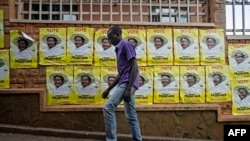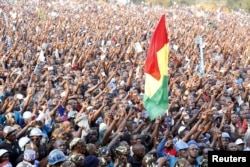Ugandan police have sharply denied local media reports that rising tension in the ongoing presidential campaigns could undermine the country’s peace in the run-up to the February 18 general election.
Police officials say they are working with the military and other security agencies to ensure a peaceful environment to enable voters to participate in the electoral process.
This, after the electoral commission issued a directive banning the use of effigies ahead of the election. Officials of the electoral commission say there has been a surge in the use of effigies by political parties for their campaigns, despite an imposed ban by the electoral body in the 2010 general election.
Fred Enanga, spokesman for the Uganda police, says police officers have launched a nationwide campaign to remove all effigies, since, he says, they pose a security threat ahead of the presidential, legislative and local elections.
The police also urged citizens to help with the removal of effigies.
“Carrying an effigy, you can find criminals taking advantage of it. Sometimes when it’s been transported on a truck, you cannot know what is hidden inside. So, for security purposes it was found that it was not proper to continue using, displaying in roadsides, on verandas indicating a liking for them,” said Enanga.
Social media
He called on politicians and their supporters to stop using social media platforms including Twitter and Facebook to engage in fear mongering, which he says create unnecessary tension. He says the police have the manpower and are ready to make sure elections are peaceful. Opposition supporters have accused the governing party of intimidation and harassment of supporters - an accusation the ruling party denies.
Officials say, all political parties are heavily using social media as a strategic campaign tool for the first time in the country’s polls. Enanga also says police have beefed up security details for all the presidential candidates, particularly in areas where there have been previous isolated incidents of violence. He denied reports suggesting there are early warning signs of possible election violence.
“We want to come out and inform the public and the world that this has been one of the most peaceful electoral campaigns. I must say it has been the most high-tech and at the same time tension-free, because out of 900 campaign programs, I have to confirm that we have less than 10 incidents of violence,” said Enanga.
“The only difference is that this campaign has been very competitive and it has been very popular that the public has actually shown interest and understood the relevance of the vote as far as elections are concerned… In the region that we are today, it is Uganda and the Kampala city which stand out to be one of the most peaceful countries and cities in the region…,” he added.
Volunteers controversy
Critics say the training of volunteers to help the police to prevent violence at the polls is a ploy by the government to intimidate, harass and ultimately suppress their vote to ensure President Yoweri Museveni wins the presidential election.
“That is not true that there is continuous training of militias… and equipping them with tools claiming that they were to be used in the protection of votes and so on,” said Enanga. “It is something that the government came out strongly to condemn and to prohibit, and all those militias were disbanded by the police.”
Local media reported a senior member of the governing party warning that there is intelligence that opposition supporters could create chaos in the capital, Kampala, if their candidate fails to win the presidential vote. This prompted Ugandans to demand police ensure peace during the electoral process.
“In every campaign you would find there are certain acts of negative campaigning and dirty politics done by candidates who are probably, are behind in the polls. For this we do have credible information of plans by individuals who wanted to promote violence by declaring parallel results to those of the electoral commission,” said Enanga.





